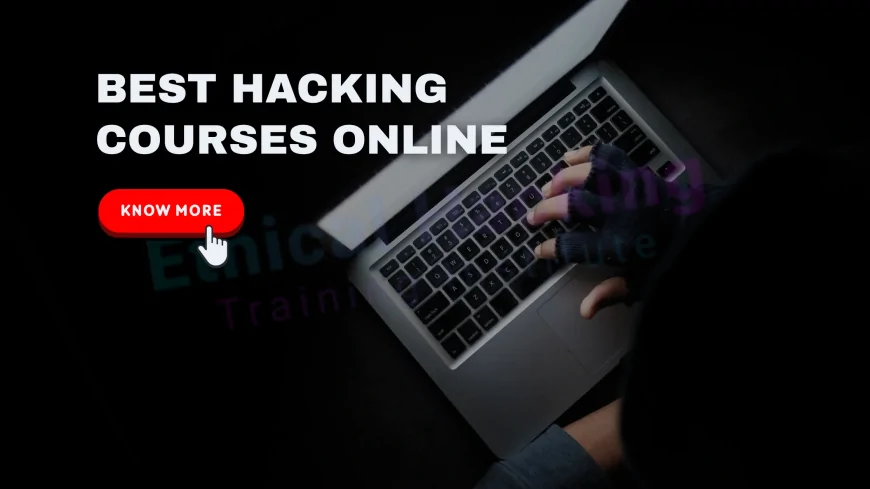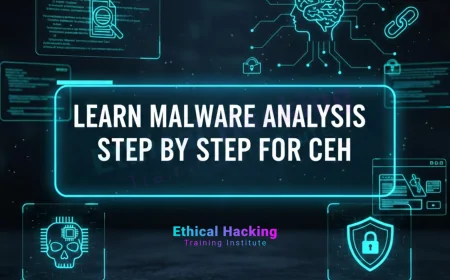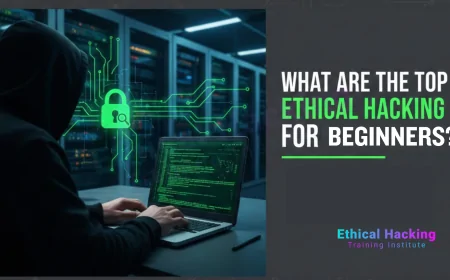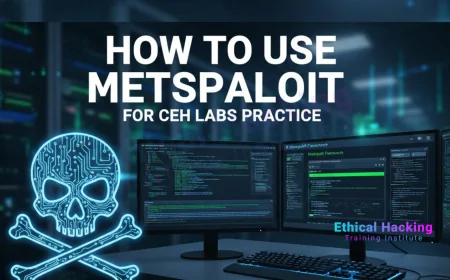Best Hacking Courses for Beginners and Experts Alike | Beginner to Expert: Best Hacking Courses You Can Take Online
Explore the best ethical hacking courses for beginners and advanced professionals in 2025. Learn hands-on from platforms like TryHackMe, CEH, OSCP, and more to boost your cybersecurity career.

Table of Contents
- Introduction
- Why Learn Ethical Hacking?
- Types of Hacking Courses
- Top Hacking Courses for Beginners
- Top Hacking Courses for Experts
- Popular Hacking Certifications
- Free vs Paid Hacking Courses
- Importance of Hands-On Training
- Best Online Platforms for Learning Hacking
- Career Paths in Ethical Hacking
- Popular Tools You’ll Learn
- Top Virtual Labs and Simulators
- Top Training Institutes Worldwide
- Tips for Success in Hacking Courses
- Typical Course Duration & Pricing
- What’s New in Hacking in 2025?
- FAQs
- Conclusion
Introduction
In today’s digital age, hacking isn’t just a buzzword — it’s a high-demand skill. Whether you're a beginner with zero experience or an experienced IT professional, mastering ethical hacking opens doors to cybersecurity careers, freelance opportunities, and global certifications.
Why Learn Ethical Hacking?
With rising cyber threats, organizations are hiring ethical hackers to identify and fix vulnerabilities before malicious actors exploit them. Ethical hacking helps you:
- Secure systems from cyberattacks
- Understand how attackers think
- Build a rewarding career in cybersecurity
- Work as a penetration tester, red teamer, or security analyst
Types of Hacking Courses
Courses are available in various formats to suit different learning goals:
- Beginner-Level Courses: Fundamentals, terminology, tools
- Intermediate Courses: Network hacking, web security
- Advanced Courses: Red teaming, exploit development
- Certifications: CEH, OSCP, CompTIA PenTest+
Top Hacking Courses for Beginners
- TryHackMe - Pre Security Learning Path: Hands-on introduction with gamified learning
- Cybrary – Introduction to Ethical Hacking: Beginner modules with real-world use cases
- Google Cybersecurity Certificate (Coursera): Great starting point for total newbies
- Codecademy – Introduction to Cybersecurity: Interactive platform for learning basic concepts
Top Hacking Courses for Experts
- Offensive Security OSCP: Penetration testing with Kali Linux
- EC-Council CEH v13: Industry-standard ethical hacking certification
- eLearnSecurity eCPPTv2: Advanced practical pen-testing
- SANS GPEN: GIAC Penetration Tester course
Popular Hacking Certifications
- CEH – Certified Ethical Hacker
- OSCP – Offensive Security Certified Professional
- CompTIA PenTest+
- CPT – Certified Penetration Tester
- CHFI – Computer Hacking Forensic Investigator
Free vs Paid Hacking Courses
Free platforms offer foundational learning but usually lack structured pathways, live support, and certification. Paid courses offer certifications, mentor access, and real labs.
Importance of Hands-On Training
Theoretical knowledge is not enough. Practice in virtual environments using tools like Metasploit, Wireshark, Burp Suite, and Nmap is critical. Platforms like Hack The Box and TryHackMe simulate real-world scenarios.
Best Online Platforms for Learning Hacking
1.TryHackMe
-
Best For: Beginners to Intermediate learners
-
Features: Guided learning paths (Pre Security, Offensive Pentesting, Red Team), gamified labs, real-world virtual machines.
-
Why WebAsha Recommends: It’s beginner-friendly, cost-effective, and includes practical content aligned with CEH and OSCP.
2. Hack The Box (HTB)
-
Best For: Intermediate to Advanced learners
-
Features: Hacking real machines in a competitive Capture The Flag (CTF) style environment.
-
Why WebAsha Recommends: Ideal for CEH/OSCP students to practice red teaming, exploit development, and post-exploitation techniques.
3. EC-Council CyberQ / iLabs
-
Best For: CEH, CPENT, CHFI, and other EC-Council exam preparation
-
Features: Official hands-on labs matching the EC-Council curriculum.
-
WebAsha Use Case: As an EC-Council ATC (Accredited Training Center), WebAsha provides CyberQ access to all CEH students.
4. WebAsha LMS Platform
-
Best For: CEH and cybersecurity course enrollees at WebAsha
-
Features: Recorded sessions, downloadable notes, assignments, quizzes, and hands-on task submission portal.
-
Added Benefit: Includes instructor feedback, resume help, and placement tracking.
Career Paths in Ethical Hacking
Completing a hacking course can lead to:
- Penetration Tester
- Red Team Operator
- Security Analyst
- Bug Bounty Hunter
- Cybersecurity Consultant
Popular Tools You’ll Learn
- Wireshark
- Burp Suite
- Nmap
- Metasploit
- John the Ripper
- Aircrack-ng
Top Virtual Labs and Simulators
- TryHackMe Labs
- Hack The Box
- EC-Council CyberQ
- VulnHub
- OWASP Juice Shop
Top Training Institutes Worldwide
WebAsha Technologies — Pune, India
-
EC-Council Accredited, offering CEH v13, CPENT, CHFI, VAPT, SOC Analyst, and OSCP modules reddit.com+15webasha.com+15londonexplorers.com+15
-
Hands-on labs with real-time cyber ranges and job-focused training webasha.com
-
Strong placement support, with alumni placed in MasterCard and other firms reddit.com+5webasha.com+5webasha.com+5
-
Student testimonials praise trainers, infrastructure, and placement assistance londonexplorers.com+9londonexplorers.com+9sulekha.com+9
Tips for Success in Hacking Courses
- Practice daily in labs
- Join ethical hacking communities
- Participate in Capture The Flag (CTF) competitions
- Follow cybersecurity news and zero-day exploits
Typical Course Duration & Pricing
- Duration: 2 weeks to 3 months
- Pricing: Free to ₹1.5 Lakhs ($0 – $1500)
What’s New in Hacking in 2025?
- AI-based attack detection and evasion
- Cloud penetration testing is a priority
- More focus on IoT and OT systems
- Demand for red teamers and purple teamers is growing
FAQs
1. What is ethical hacking?
Ethical hacking is the legal practice of testing systems for vulnerabilities to improve security.
2. Can beginners learn hacking without coding?
Yes, basic networking knowledge is enough to start. Coding helps at advanced levels but is not mandatory initially.
3. Is CEH good for a beginner?
Yes, especially if you take the official training. It’s structured and beginner-friendly.
4. Are free hacking courses worth it?
Yes, they’re great for beginners, but for certification or job-readiness, paid options are better.
5. What tools do ethical hackers use?
Popular tools include Nmap, Burp Suite, Wireshark, Metasploit, Nikto, and Aircrack-ng.
6. How long does it take to learn hacking?
Beginner-level skills can be acquired in 2–3 months. Mastery takes consistent learning over 1–2 years.
7. What’s the best online hacking platform?
TryHackMe for beginners and Hack The Box for advanced users are widely recommended.
8. Can I get a job after taking a hacking course?
Yes, especially if it includes certification and hands-on labs. CEH, OSCP, and GPEN are valued by employers.
9. Is ethical hacking legal?
Yes, when performed with permission from the system owner or during authorized penetration testing.
10. Which certification is better: CEH or OSCP?
CEH is better for beginners; OSCP is more practical and advanced, suitable for professionals.
11. What programming languages help in hacking?
Python, Bash, PowerShell, and JavaScript are helpful depending on your hacking goals.
12. Is hacking a good career in 2025?
Absolutely. The demand for ethical hackers and security testers is at an all-time high.
13. Can I become a hacker without a degree?
Yes, many ethical hackers are self-taught or come from non-CS backgrounds, provided they have skills and certifications.
14. What is penetration testing?
Penetration testing involves simulating cyberattacks to test the security of systems and applications.
15. What’s the difference between black hat and ethical hacking?
Black hat hacking is illegal and malicious; ethical hacking is legal and helps protect systems.
16. Are there weekend courses for hacking?
Yes, many platforms offer flexible learning including evening and weekend classes.
17. What is red teaming?
Red teaming involves emulating real-world attacks to test an organization’s defense mechanisms.
18. Which is the best CEH training institute in India?
WebAsha Technologies, Koenig Solutions, and InfoSecTrain are top-rated in India for CEH training.
19. What is a bug bounty?
Bug bounties are rewards given by companies to ethical hackers for finding vulnerabilities in their systems.
20. Do I need a powerful laptop to learn hacking?
No, a mid-range laptop with virtualization support (8GB+ RAM) is sufficient for most labs.
Conclusion
Whether you’re new to cybersecurity or looking to upgrade your hacking skills, 2025 offers a vast array of hacking courses that suit all levels. With platforms like TryHackMe, OSCP, and CEH leading the way, and practical labs to reinforce learni
What's Your Reaction?
 Like
0
Like
0
 Dislike
0
Dislike
0
 Love
0
Love
0
 Funny
0
Funny
0
 Angry
0
Angry
0
 Sad
0
Sad
0
 Wow
0
Wow
0

















